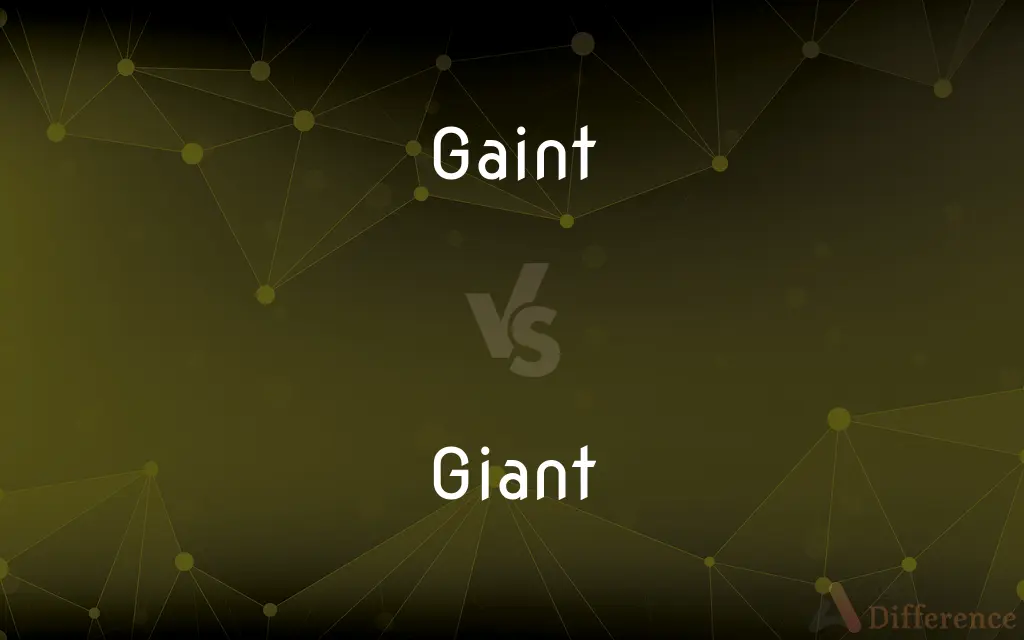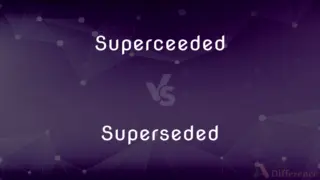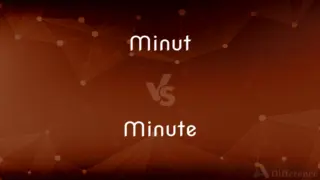Gaint vs. Giant — Which is Correct Spelling?
By Tayyaba Rehman — Updated on March 21, 2024
The common misspelling "Gaint" is incorrect; the correct spelling is "Giant," referring to a very large or powerful person or thing.

Table of Contents
Which is correct: Gaint or Giant
How to spell Giant?

Gaint
Incorrect Spelling

Giant
Correct Spelling
ADVERTISEMENT
Key Differences
Think of the phrase "I am a Giant," both words having "I" before "A."
Remember it as "I before A" in "Giant."
Giants are tall, just like the letter 'i' is taller than 'a'.
The word "gain" is unrelated; eliminate the temptation to write "gaint."
Visualize a giant holding an "I" flag before an "A" flag.
ADVERTISEMENT
How Do You Spell Giant Correctly?
Incorrect: The gaint panda is an endangered species.
Correct: The giant panda is an endangered species.
Incorrect: She felt like a gaint standing next to her friends.
Correct: She felt like a giant standing next to her friends.
Incorrect: The story is about a gaint who lives in the mountains.
Correct: The story is about a giant who lives in the mountains.
Incorrect: That building looks like a gaint compared to the ones around it.
Correct: That building looks like a giant compared to the ones around it.
Incorrect: He was a gaint in the field of neuroscience.
Correct: He was a giant in the field of neuroscience.
Giant Definitions
A "Giant" is a mythical being of great stature and strength.
Jack faced a giant at the top of the beanstalk.
In astronomy, a "Giant" refers to a star that is larger and brighter than most.
The sun will become a red giant in billions of years.
In biology, "Giant" refers to a species or variant that is larger than the typical kind.
The giant squid remains elusive in the ocean depths.
"Giant" can symbolize someone extraordinary in abilities or achievements.
Einstein was a giant in the realm of physics.
In folklore, giants (from Ancient Greek: gigas, cognate giga-) are beings of human-like appearance, but are at times prodigious in size and strength or bear an otherwise notable appearance. The word giant is first attested in 1297 from Robert of Gloucester's chronicle.
A person or thing of great size.
A person or thing of extraordinary power, significance, or importance
A giant in the field of physics.
Automotive industry giants.
Greek Mythology One of a race of humanlike beings of enormous strength and stature who were destroyed in battle with the Olympians.
A being in folklore or myth similar to one of these beings.
A gymnastic maneuver in which the body is swung, fully extended, around a horizontal bar.
Marked by exceptionally great size, magnitude, or power
A giant wave.
A giant impact.
A mythical human of very great size.
(mythology) Specifically:
Any of the gigantes, the race of giants in the Greek mythology.
A jotun.
A very tall and large person.
A tall species of a particular animal or plant.
(astronomy) A star that is considerably more luminous than a main sequence star of the same temperature (e.g. red giant, blue giant).
(computing) An Ethernet packet that exceeds the medium's maximum packet size of 1,518 bytes.
A very large organisation.
The retail giant is set to acquire two more struggling high-street chains.
A person of extraordinary strength or powers, bodily or intellectual.
(gymnastics) A maneuver involving a full rotation around an axis while fully extended.
Very large.
A man of extraordinari bulk and stature.
Giants of mighty bone and bold emprise.
Any animal, plant, or thing, of extraordinary size or power.
Like a giant; extraordinary in size, strength, or power; as, giant brothers; a giant son.
Any creature of exceptional size
A person of exceptional importance and reputation
An unusually large enterprise;
Walton built a retail giant
A very large person; impressive in size or qualities
Someone or something that is abnormally large and powerful
An imaginary figure of superhuman size and strength; appears in folklore and fair tales
A very bright star of large diameter and low density (relative to the Sun)
Of great mass; huge and bulky;
A jumbo jet
Jumbo shrimp
"Giant" can describe anything unusually large in size or scale.
The company is a giant in the tech industry.
Giant Meaning in a Sentence
In the tech industry, he's considered a giant.
The children loved the fairy tale about the friendly giant.
Conservation efforts are crucial for the survival of the giant panda.
She always felt like a giant when she wore her high-heeled boots.
He's a gentle giant with a kind heart.
The new cruise ship is a giant compared to the old fleet.
The giant sequoias are among the oldest living organisms on Earth.
The company became a giant in the global market.
A giant leap forward in medicine came with the discovery of antibiotics.
They watched as the giant wave approached the shore.
Their new television is a giant screen that fills the entire wall.
The giant oak tree has stood in the park for centuries.
The project was a giant undertaking that took years to complete.
The giant red spot on Jupiter is a storm larger than Earth.
She tackled the giant pile of laundry that had accumulated.
Their victory was a giant step towards equality.
The athlete's achievements made him a giant in the world of sports.
The sculpture was a giant abstract piece that dominated the gallery.
In the realm of superheroes, he's a giant.
The giant clam can weigh over 200 kilograms.
They built a giant snowman during the winter storm.
The book is a giant collection of all his works.
The museum's dinosaur exhibit features a giant skeleton.
The storm brought giant hailstones down on the town.
Giant Idioms & Phrases
Awaken the giant
To provoke or stir up someone or something powerful.
The unfair policy changes served to awaken the giant of public dissent.
Sleeping giant
Something or someone with great but unrealized or emerging potential.
The small tech company was a sleeping giant, poised to revolutionize the industry.
Giant of industry
A highly influential figure in a particular industry.
He was considered a giant of industry, having transformed the way people use technology.
Giant killer
An individual or team that defeats a much stronger opponent.
The underdog team proved to be a giant killer by defeating the reigning champions.
Facing a giant
Dealing with a very difficult challenge or opponent.
Starting her own business felt like facing a giant, but she was determined.
Giant leap
A very large step or advance, especially in progress or improvement.
Landing on the moon was described as a giant leap for mankind.
Feet of a giant
Refers to undertaking a task or following a path that is influenced by someone very influential or successful.
As an emerging novelist, she feels like she's walking in the feet of giants.
Giant step
A significant action or decision that has a big impact.
Moving to a new country was a giant step for her, but she was ready for the adventure.
Giant in one's own right
To be very successful or influential in one's own domain or field.
Although she always felt overshadowed by her famous sister, she was a giant in her own right.
Common Curiosities
Why is it called Giant?
It's derived from the Latin word "gigas," meaning "giant," referring to beings of great size or stature.
What is the root word of Giant?
The root word is the Latin "gigas," meaning a giant.
Which vowel is used before Giant?
The vowel "a" is used before the -nt in "Giant."
What is the pronunciation of Giant?
It is pronounced as /ˈdʒaɪ.ənt/.
What is the verb form of Giant?
There isn't a direct verb form of "Giant." However, "gigantic" can be turned into the verb "gigantize."
Which conjunction is used with Giant?
No specific conjunction is exclusively paired with "Giant."
Which preposition is used with Giant?
There isn't a specific preposition exclusively used with "Giant." However, "of" can be used, as in "a giant of industry."
What is the singular form of Giant?
The singular form is "Giant."
What is the plural form of Giant?
The plural form is "Giants."
Is Giant a vowel or consonant?
"Giant" is a word containing both vowels and consonants.
Is the word Giant is imperative?
No, "Giant" is not an imperative.
Which determiner is used with Giant?
Determiners like "this," "that," "a," or "the" can be used with "Giant."
Which article is used with Giant?
Both "a" and "the" can be used with "Giant," depending on context.
Is Giant an adverb?
No, "Giant" is not an adverb.
What is another term for Giant?
Another term is "colossus" or "behemoth."
What is the first form of Giant?
The first form is "Giant" itself.
Is Giant a noun or adjective?
"Giant" can be both a noun and an adjective.
Is Giant a negative or positive word?
It's neutral, but context can give it positive or negative connotations.
Is the word Giant is Gerund?
No, "Giant" is not a gerund.
Is the word “Giant” a Direct object or an Indirect object?
It can be a direct object, as in "I saw a giant," or an indirect object in different contexts.
How many syllables are in Giant?
There are two syllables in "Giant."
What part of speech is Giant?
"Giant" is primarily a noun but can also be an adjective.
What is the opposite of Giant?
The opposite is "dwarf" or "midget."
What is the third form of Giant?
Not applicable for the same reason.
Is Giant an abstract noun?
No, it is a concrete noun when referring to a large being but can be abstract when symbolizing greatness in achievements.
Is the Giant term a metaphor?
It can be, as in "He is a giant in the music industry."
How do we divide Giant into syllables?
It is divided as Gi-ant.
What is the second form of Giant?
Not applicable as "Giant" is primarily a noun.
Is Giant a countable noun?
Yes, for example, "There were three giants in the story."
Is Giant a collective noun?
No, "Giant" is not a collective noun.
What is a stressed syllable in Giant?
The first syllable, "Gi," is stressed.
How is Giant used in a sentence?
"He marveled at the giant statue in the town square."
Share Your Discovery

Previous Comparison
Superceeded vs. Superseded
Next Comparison
Minut vs. MinuteAuthor Spotlight
Written by
Tayyaba RehmanTayyaba Rehman is a distinguished writer, currently serving as a primary contributor to askdifference.com. As a researcher in semantics and etymology, Tayyaba's passion for the complexity of languages and their distinctions has found a perfect home on the platform. Tayyaba delves into the intricacies of language, distinguishing between commonly confused words and phrases, thereby providing clarity for readers worldwide.














































